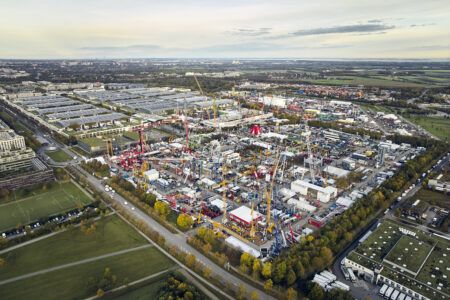AGCO’s senior vice president of engineering Kelvin Bennett is based in Switzerland, where he oversees a 2,000-strong team working on hundreds of projects at any one time across the globe. But, despite his seniority at the OEM giant, Bennett is far from being a stiff corporate businessman.
He grew up on a farm in Arkansas, which sowed the seeds of his passion for mechanisation and technology in agriculture, and perhaps also helps to explain his relaxed and friendly demeanour.
“I’m very bullish about agriculture,” he says, instantly enthused by the subject. “Feeding the world is a huge responsibility. The more the global population grows, the more pressure and focus there will be on the industry. I’ve been in the industry my whole career, I’m super-proud and passionate, and appreciative that
I get to work in an industry with such a noble cause. And I wouldn’t change it for the world.”
Bennett’s career in agriculture began in the US, but has involved long periods of globetrotting. After leaving farming, he worked for a rival for 10 years before joining AGCO in 2007 as a combine manager in Kansas. After that, he became site leader in Jackson, Minnesota for AGCO’s TerraGator sprayers and Challenger tractors. Since that time, he has been based outside the US.
He was posted for four years to Brazil where he oversaw South American operations, then had a couple of years working for AGCO’s Massey Ferguson brand in Beauvais, France. From mid-2020 he has been based in Neuhausen, in Switzerland, where he was appointed senior vice president of engineering.
Switzerland, with its spectacular landscapes, is an ideal location for a man who loves the great outdoors. “I’ve always been an outdoors man,” he says. “Growing up on a farm, I spent a lot of time outside. I’m not a golfer, but I love watching sports events, or going hiking, fishing and hunting. It’s especially valuable getting outside as I have an office job. My other hobby, as an engineer, is building things. It could be
a patio, remodelling something in the house, or working in old cars and tractors.”
An agricultural giant
Duluth, Georgia-headquartered AGCO was established in 1990. It designs and manufactures tractors, propelled sprayers, smart farming technologies, seeding equipment, and tillage equipment. Over the years, AGCO has expanded its business with major purchases such as Fendt in 1997, and the rights to the Challenger tractor name in 2002. Other important brands include Massey Ferguson, Row Gator and Terra Gator, Valtra and White Farm Equipment.
With such a diverse portfolio and vast global operations, it’s no wonder Bennett finds it hard to depict a typical day at work. “We could have upwards of 100 projects from early pre-planning discussions to short-term post production, six months after production, and everything in between. It could be a cab or an engine or whatever. There are big projects, small projects. The 2,000 engineers are the ones who do all the work, along with their partners in manufacturing.”
Autonomous vehicles
One of the biggest trends in the sector is the use of more automation and advanced technologies. Especially as there are labour shortages and seasons are getting tighter, manufacturers have to maximise yield.
“The question for our engineers is – how can automation make vehicles more efficient? We already have semi-autonomous solutions. With guidance systems today, there’s pretty much no need for a steering wheel in some vehicles, and operators are there more to ensure safety. If things run well, they barely have any engagement,” says Bennett. “Our CEO announced in December that thanks to Wall Street investment, we’ll be getting autonomous solutions starting with retrofits and moving to fully intrinsic designs from 2024-25. There will initially be limited use cases, but it will grow from there.”
Related to automation are technologies that allow platooning and remote control. One possibility is lots of smaller vehicles operating in a ‘swarm’ formation.
“All these things are in scope,” says Bennett. “In the army, you see one person operating platoons of four or five unmanned vehicles and you could do the same with tractors for sure. Our engineers are working on machine-to-machine communication in order to help to optimise performance. A lead machine has to be able to control, or influence the followers. Machine-to-machine will probably come before full autonomy.”
Precision technologies that maximise the yield potential of the crop are critical, he says. With space at a premium and so many hungry mouths to feed, farmers must make the most of what space they have. Meanwhile, these technologies also reduce inputs like fertiliser, pesticides and herbicides.
“The more you reduce them, the better it is for the environment and the more yield you get,” he says.
A safer future
As machines move towards full autonomy, safety becomes ever more vital, and machines need to shut down instantly if there’s any risk of harm. This entails the development of a range of sensors to protect the machines and the people who work with them.
“We’re offering more redundancy in our safety systems and continuing to update the safety measures,” he says. “If you want to see at night, or in dust or limited visibility, that requires different types of sensors. You need a lattice or multiple sensor technologies to make sure you have the redundancy to have the right level of safety.”
AGCO continues to work with
a huge range of suppliers to build its numerous machines. As a large company with a turnover of US$12 billion, it can vertically integrate core strategic aspects.
“Building machines as complex as ours requires a lot of relationships with suppliers. A large combine alone might have 20,000 parts on it. We can’t manufacture and vertically integrate all 20,000 parts. We rely on key suppliers,” he concludes.





